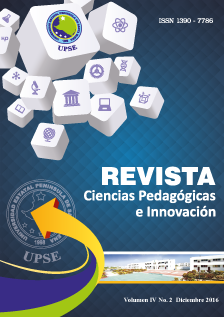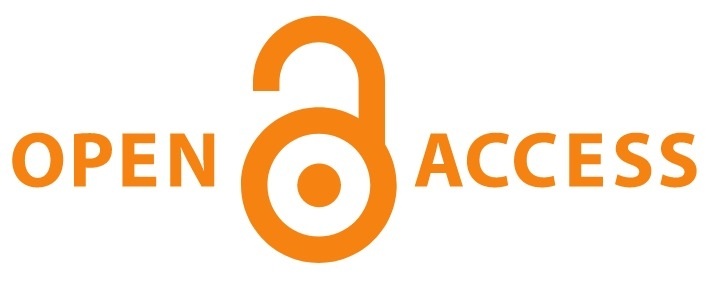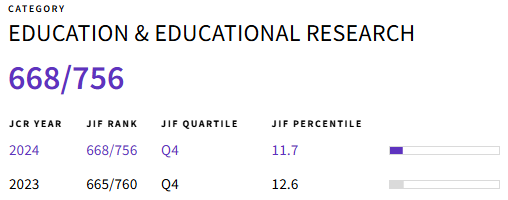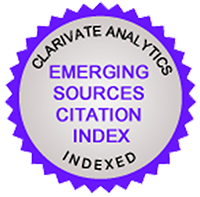A personal learning environment frame, a tasks system for the evaluation of autonomous language learning
DOI:
https://doi.org/10.26423/rcpi.v4i2.138Keywords:
Learning, Autonomy, Evaluation, Environment, PersonalAbstract
There is no doubt about the key role of ICT in the interaction and communication processes among students. ICT are thought as a mean for the reflection and self-regulation of students´ activity, which is in a permanent conscientious comparison between the perception a student has about him/herself and the one he/she nego-tiates with the rest of students, advisors and society in general terms. In this context, ICT should promote a positive influence on student formation in formal and non-formal spaces. The conditionals related to spaces combined support and union in the diversity of technological and didactical resources should guide every activity having students at the center of its conception.
It is no longer about integrating ICT to the formation process making it formal and standardized. The chal-lenge on autonomous language learning evaluation with ICT has to do with making the differences through personal characteristics of students, their learning styles, previous experiences and affective schemas.
In this paper the use of ICT is structured by means of a PLE frame for the evaluation of English autonomous language learning. It is a scaffolding of people, procedures, interaction spaces, and technological and didac-tical resources. Its components are weakly coupled by technologies and highly cohesive by the meaningful connections students establish among them.
Downloads
References
Adell, J. y Castañeda, L. (2010). Los Entornos Personales de Aprendizaje (PLEs): una nueva manera de entender el aprendizaje. En Roig Vila, R. & Fiorucci, M. (Eds.) Claves para la investigación en innovación y calidad educativas. La integración de las TIC. Alcoy: Marfi-Roma TRE Universita degil studi.
Attwell, G. (2007) Web 2.0, Personal Learning Environments and the Future of Schooling. Consultado: 20 de septiembre de 2009. Disponible: http://www.pontydysgu.org/wpcontent/uploads/2008/02/web2andfutureofschooling.pdf
Attwell, G. (2008). Personal Learning Environments: The future of education? Consultado: 24 de septiembre de 2009. Disponible: http://www.slideshare.net/GrahamAttwell/personal-learning-environment-the-future-of-education-presentation
Attwell, G. (2010) Can Web 2.0 and Social Software Help Transform How We Measure Quality in Teaching, Learning and Research? En Ehlers, U.D., Schneckenberg, D. Changing Cultures in Higher Education: Moving Ahead to Future Learning. Berlin: Springer
Brown, S. (2010). From VLEs to learning webs: the implication of Web 2.0 for learning and teaching. Interactive Learning Environments. Vol. 18, No. 1. 1-10.
Downes, S. (2010). New technology supporting informal learning.Journal of Emerging Technologies in Web Intelligence. Vol. 2, N.1. Consultado el 2 de noviembre de 2011. Disponible en: http://www.academypublisher.com/ojs/index.php/jetwi/article/view/Article/02012733
Gobal Scale of English Learning Objectives for English Photocopiables © Pearson Education Ltd 2015. Disponible en: English.com/gse
Harmelen, M. V. (2007) Personal Learning Environments [Wiki]. Consultado: 6 Mayo 2012. Disponible en: http://octette.cs.man.ac.uk/jitt/index.php/Personal_Learning_Environments
Horruitiner, P. (2007.). Introducción del libro La universidad cubana: el modelo de formación. Revista Pedagogía Universitaria., Vol. XII No. 4. pp 3 – 6.
Johnson, M. y Liber, O. (2008) The Personal Learning Environment and the human condition: from theory to teaching practice. Interactive Learning Environment Vol. 16, No. 1. 3-15.
Kieslinger, B. y Gillet, D. (2008). How social is my Personal Learning Environment (PLE)? Chesapeake, V.A: Part I. Luca, J. y Weippl, E. (Eds.). Proceedings of World Conference on Educational Multimedia, Hypermedia and Telecommunications 2008. AACE. 4984-4989.
Kolas, L. y Staupe, A. (2007). The Plexus Proto - type: A PLE Realized as Topic Maps. Paper presented at the Seventh IEEE International Conference on Advanced Learning Technologies (ICALT 2007), Niigata.
Lima, S. (2005). La mediación pedagógica con uso de las tecnologías de la información y las comunicaciones (TIC). Pedagogía 2005. Ciudad de La Habana, Cuba.
Lima, S. y Forcade, R. (2012). Estrategia para la superación profesional de los docentes en contenidos de Educación a Distancia. Revista Congreso Universidad. Vol. I, No. 2, 2012, ISSN: 2306-918X. Editorial universitaria Felix Varela. Consultado el 15 de septiembre de 2013. Disponible en: http://www.congresouniversidad.cu/revista/index.php/congresouniversidad/article/viewFile/128/114
Martínez, Y. (2015) Metodología para la evaluación del aprendizaje autónomo de Inglés con el aprovechamiento de un Entorno Personal de Aprendizaje en la UCI. Tesis en opción al grado científico de Doctor en Ciencias de la Educación. Facultad de Educación a Distancia, Universidad de la Habana.
Salinas, J. (2009). Innovación educativa y TIC en el ámbito universitario: Entornos institucionales, sociales y personales de aprendizaje. II Congreso Internacional de educación a distancia y TIC. Lima, Perú.
Santamaría, F. (2010) Evolución y desarrollo de un Entorno Personal de Aprendizaje en la Universidad de León. In: Digital Education Review, 18, 48-60. Consultado: 31 de Noviembre de 2012. Disponible: http://greav.ub.edu/der
Schaffert, S. y Hilzensauer, W. (2008). On the way towards personal learning environments: Seven crucial aspects. Elearning papers, 9.
Severance, C. y otros. (2008). the coming functionality mash-up in personal learning environments. Interactive learning environments vol. 16, no. 1, 47-62.
Wilson, S. (2005) The PLE debate begins (entrada de blog) Disponible en: http://zope.cetis.ac.uk/members/scott/blogview?entry=20051126183704
Waters, S. (2008). Here are the results from my PLN survey! Consultado el 25 de octubre de 2011. Disponible en: http://www.suewaters.com/2008/12/04/here-are-the-results-from-mypln-survey/
Comenio escribió entre 1628 y 1632 la Didáctica Magna cuyos postulados aún conservan vigencia en el ámbito educativo. 2 Editores del International Handbook of Lifelong Learning
Downloads
Published
Issue
Section
License
El titular de los derechos de autor de la obra, otorga derechos de uso a los lectores mediante la licencia Creative Commons Atribución-NoComercial-CompartirIgual 4.0 Internacional. Esto permite el acceso gratuito inmediato a la obra y permite a cualquier usuario leer, descargar, copiar, distribuir, imprimir, buscar o vincular a los textos completos de los artículos, rastrearlos para su indexación, pasarlos como datos al software o usarlos para cualquier otro propósito legal.
Cuando la obra es aprobada y aceptada para su publicación, los autores conservan los derechos de autor sin restricciones, cediendo únicamente los derechos de reproducción, distribución para su explotación en formato de papel, así como en cualquier otro soporte magnético, óptico y digital.

















